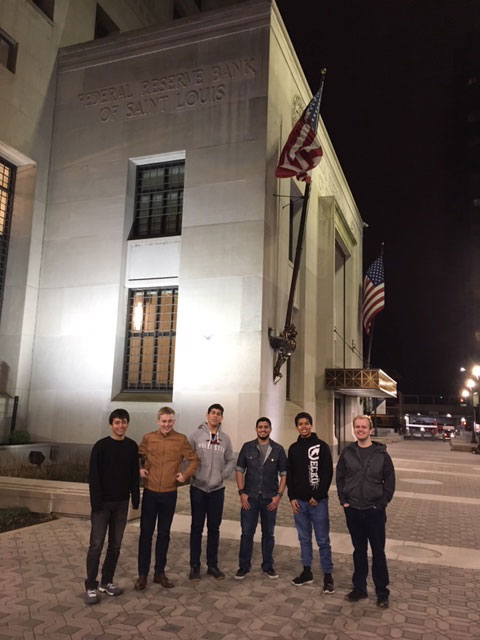Economics
Economics is a way of thinking about every aspect of human behavior – it can explain the management strategies of a business firm to why individuals partake in crime. Economics majors are trained to tackle problems by applying the “economic approach,” which relates the basic principles of rational choice to business decisions, public policy issues, and everyday life.
Economics majors have the ability to enter fields including law, politics, banking, government service, market research, insurance, real estate, and non-profit organizations among others.
What makes our Economics program distinctive?
Connect:
- Connect with professional economists and business executives through monthly Economics Club meetings.
- Participate in trips to visit the Federal Reserve Bank of St. Louis or UBS London while studying abroad at Harlaxton College.
- Work with faculty on academic research related to current economic issues.
Rigor
- 100 percent of Economic students complete an internship.
- Study a variety of subjects including International Trade, Monetary Economics, Environmental Economics, and Economic Development from faculty performing research in these fields.
- Obtain skills in data analysis valuable in the current job market.
- Learn two popular statistical software packages (Stata and R) used by economists and business analysts.
Bright futures:
- Recent graduates have earned positions at Berry Global, CitiBank, Liberty Federal Credit Union, Franklin Templeton, and The Boston Red Sox.
- Economics graduates have pursued graduate degrees at institutions like Clemson University, Northern Illinois University and Barcelona Graduate School of Economics.
Bachelor of Science in Business Administration, Economics Major
This degree requires completion of 124 semester hours, allocated as follows:
General Education – 38 hours including Quantitative Methods 227; Management 497
Common Core – 45 hours: The purpose of the common core is to provide students with careful preparation in the fundamental tools of decision making and leadership. All Schroeder School of Business Accounting Students complete the following courses: Accounting 210, 211, 321, 398; Business 100, 200, 400; Economics 101,102; Finance 361; Logistics/Supply Chain Management 315; Law 201; Management 331, 377; Marketing 325; Quantitative Methods 160.
Economics Major – 18 hours: ECON 345, 346; four or more courses selected from the following: ECON 300, 320, 372, 400, 425, 435, 470, 497, 380, 395; May substitute two 300/400 level courses (6 hours) with a prefix of ACCT, BUS, CS, FIN, LAW, LSCM, MGT, MKT, QM or STAT.
Office Phone
812-488-2851
Office Email
businessadmin@evansville.edu
Office Location
Room 152, Schroeder School of Business Building

